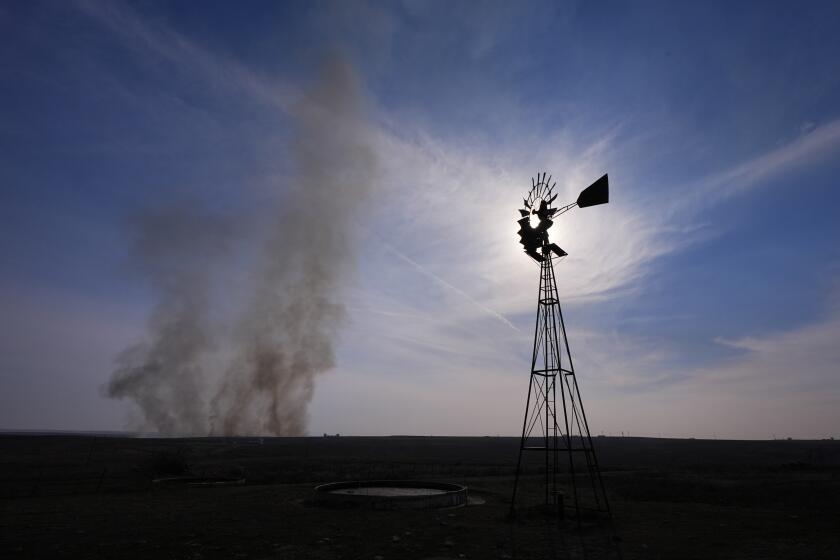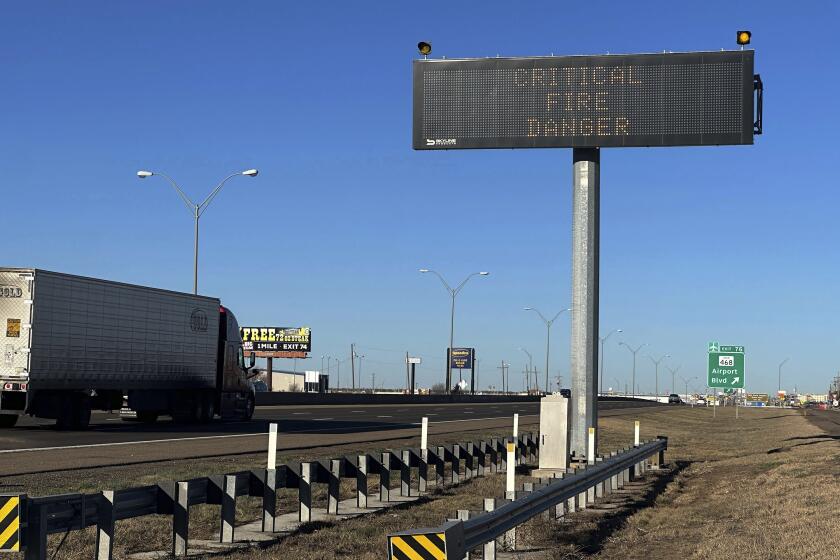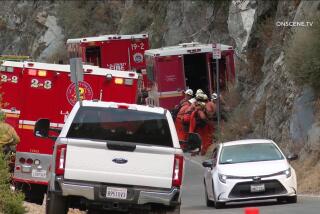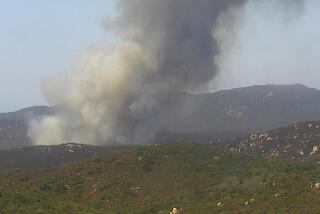Influx of firefighters, cooler weather help keep Texas Panhandle wildfires in check
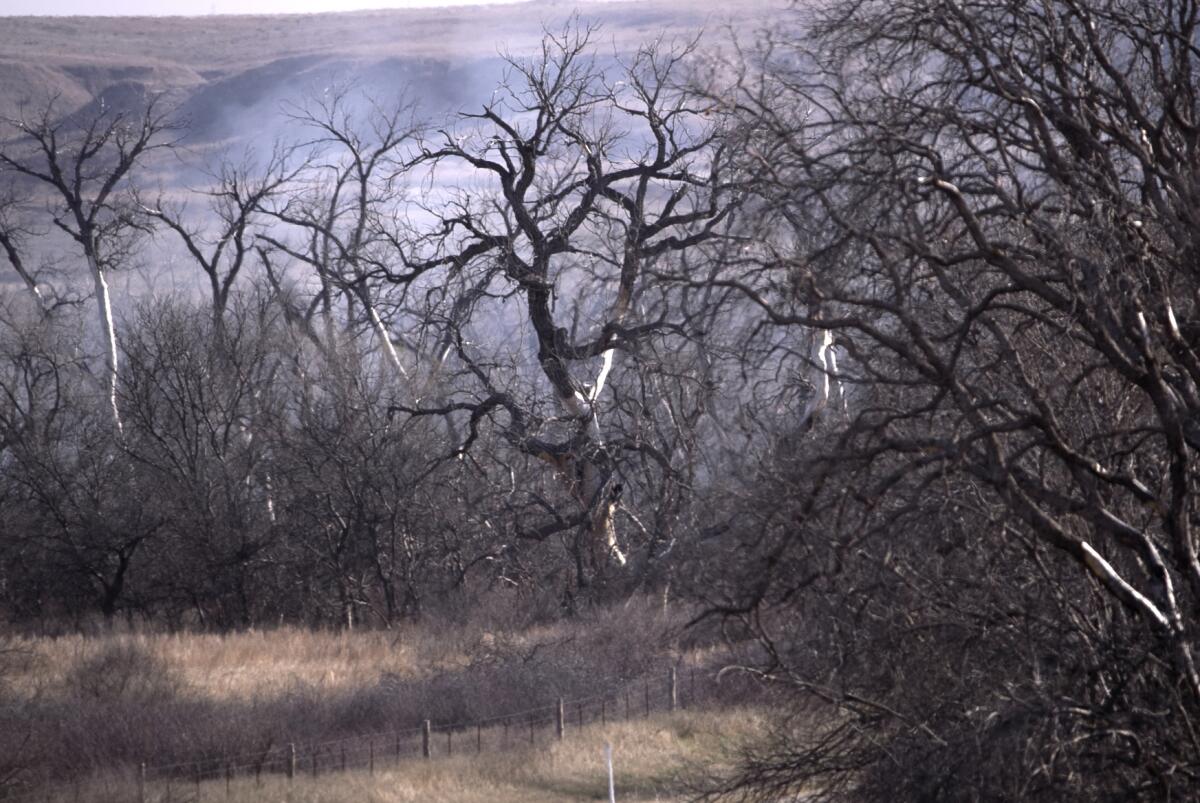
McALLEN, Texas — An influx of hundreds of firefighters and more favorable weather conditions on Monday helped authorities in the Texas Panhandle keep the largest wildfire in state history from threatening more homes and communities, fire officials said.
Strong winds spread flames and led to the evacuation of the small town of Sanford on Sunday while airplanes dropped fire retardants to stop a blaze that was quickly contained thanks to hundreds of firefighters who were deployed on the ground, said Deidra Thomas, a spokeswoman for the Hutchinson County Emergency Management agency.
“Yesterday had we not had the resources we had, that fire could have been catastrophic,” Thomas said Monday. “We’re in a really good position today and tomorrow and hopefully through the rest of the week.
“The weather is going to be favorable, the winds are going to be much lower, the humidity is coming up, and that’s fantastic news for us.”
Although officials have not released an official cause of the largest fire — the Smokehouse Creek fire that scorched more than 1 million acres and destroyed dozens of homes near the towns of Stinnett and Canadian — a lawsuit filed Friday in Hemphill County alleges a downed power line near the town of Stinnett sparked the blaze on Feb. 26.
The fire’s explosive growth slowed amid snow, ebbing winds and falling temperatures, but it was still untamed and threatening more death and destruction.
The lawsuit, filed on behalf of Stinnett homeowner Melanie McQuiddy against Xcel Energy Services Inc. and two other utilities, alleges the blaze started “when a wooden pole defendants failed to properly inspect, maintain and replace, splintered and snapped off at its base.”
A spokesperson for Xcel said in a statement there is no official determination for the causes of any of the fires in the Texas Panhandle and that investigations are ongoing.
As of Sunday afternoon, the Smokehouse Creek fire was 15% contained and two other fires were at least 60% contained. Strong winds, dry grass and unseasonably warm temperatures fed the blazes.
A cluster of fires has burned across more than 1,900 square miles in rural areas surrounding Amarillo. The largest blaze, Smokehouse Creek, accounting for nearly 1,700 square miles and spilling into neighboring Oklahoma.
U.S. Homeland Security Secretary Alejandro Mayorkas on Sunday said the federal government has devoted funds, equipment and personnel to assist with battling the fires, but warned more extreme weather could be coming.
“More than a million acres have burned. And we are in winter, and this is the largest fire in Texas history,” Mayorkas said in a CNN interview. “We, as a country and as a world, have to be ready for the increasing effects of extreme weather caused by climate change. It’s a remarkable phenomenon, and it will manifest itself in the days to come, and we have to prepare for it now.”
Wind gusts of up to 45 mph were expected with humidity below 10% and a high temperature of 75 degrees.
The National Weather Service late Sunday warned of an elevated fire risk through Monday in the area due to winds of 15-20 mph.
As firefighters fought the unprecedented wildfires, humanitarian organizations pivoted to victims who have lost their homes and livelihoods. Residents began clearing affected property on Saturday, and by Sunday the extent of the loss began mounting.
Donations ranging from $25 to $500 have been critical for the Hutchinson County United Way Wildfire Relief Fund, which is dispersing proceeds to displaced families.
The organization has heard estimates of more than 150 homes being affected in the county, noting the fires extend to at least five other counties, said Julie Winters, executive director for Hutchinson County United Way. .
A steady outpouring of donated clothing, water and hot meals quickly overwhelmed one community in the affected area. The city of Borger, Texas, urged people in a social media post to redirect donation efforts from food and water to clean-up supplies including shovels, rakes, gloves and trash bags.
Associated Press writers Sean Murphy in Oklahoma City, Thomas Strong in Washington and Trisha Ahmed in Minneapolis contributed to this report.
More to Read
Sign up for Essential California
The most important California stories and recommendations in your inbox every morning.
You may occasionally receive promotional content from the Los Angeles Times.
